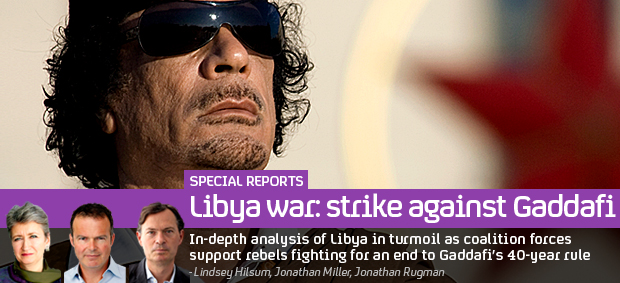Britain’s alleged role in Libya rendition condemned
David Cameron promises to look at “significant accusations” made against Britain as a spokesman for Libya’s new leadership claims the UK helped with the “kidnapping” of Gaddafi’s opponents.
Speaking in a personal capacity, Guma El-Gamaty told Channel 4 News: “It was kidnapping, handing over political opponents to a dictator who has no mercy, who tortures people.”
But he said the issue would not harm Britain’s relations with Libya‘s new interim authority because of the role London has played in ousting Colonel Gaddafi. “What Britain did over the last six months more than makes up for mistakes like this.”
Mr El-Gamaty was referring to the cases of Abdel Hakim Belhadj, a former leader of the Libyan Islamic Fighting Group who now heads Tripoli’s military council, and Abu Munthir, an al-Qaeda suspect.
Whether Britain played a role in the rendition of Libyan terrorism suspects will be considered by the Gibson inquiry, which is currently looking at cases of British nationals held at Guantanamo Bay.
MP Malcolm Rifkind, who sits on the Intelligence and Security Committee, told Channel 4 News he is pushing to investigate the alllegations as fully as possible.
“We have the power to take evidence from the head of the security services but we do not have the power to require them to come against their will,” he said.
“The agencies have had a long and honourable tradition of providing witnesses to the committee when it wants to take evidence.
“At the moment that is up to them, they have that discretion. That is why we have made very strong recommendations to the Government that that has to change.”
Cameron’s statement
Prime Minister David Cameron said in a Commons statement: “Significant accusations have been reported today that under the last Government, relations between the British and Libyan security services became too close, particularly in 2003.
“It was because of accusations of complicity by the British security services in the mistreatment of detainees overseas, including rendition, that I took steps in July last year to sort this problem out.
“We’ve issued new guidance to security and intelligence services personnel on how to deal with detainees held by other countries, and we’ve asked retired judge, Sir Peter Gibson, to examine issues around the detention of terrorist suspects overseas, and this inquiry has already said it will look at these latest accusations very carefully.”
Jack Straw, who was Foreign Secretary from 2001-06, said “it was the consistent policy of the previous government, as yours, to be opposed to any complicity in torture or ill-treatment or unlawful rendition”.
A source close to Mr Belhadj told the Times that he was betrayed when he sought asylum through the British High Commission in Malaysia in 2004.

‘Belhadj never associated with al-Qaeda’
He is reported to have been seized by the CIA and sent back to Libya, where he was imprisoned. He is alleged to have been questioned in prison by MI5 and MI6 officers and is threatening to sue the British Government.
Mr El-Gamaty defended him: “On a personal level, he feels aggrieved, but life goes on. I don’t deny Belhadj’s right to ask for an apology. That is his right.
“Belhadj never associated with al-Qaeda. I know that for a fact. He ran away from Afghanistan because he didn’t want anything to do with al-Qaeda.”
‘Traded information’
Documents discovered in Tripoli appear to suggest that the British security services traded information with Libya in return for intelligence extracted from terror suspects under interrogation in Libyan prisons.
The Old Bailey heard during a trial in 2006 that Mr Munthir had discussed a plot to stage multiple bomb attacks on the UK with al-Qaeda terrorist Omar Khyam.
The documents apparently show that the CIA arranged his rendition to Libya, with Britain providing the intelligence tip-off. What happened to him is unclear.
Mr Cameron’s official spokesman said Sir Peter Gibson’s inquiry was “well-placed” to look into the new allegations. He added: “We don’t comment on intelligence matters, but clearly in order to protect British citizens, we have to work with governments all around the world.
“Some of those governments don’t necessarily share our standards, but we need to do what we need to do to fight against terrorism and to protect our citizens.”
‘Scandalous revelations’
Shami Chakrabarti, director of Liberty, said: “The latest scandalous revelations of intimate trading of ‘detainee debriefings’ with the Gaddafi regime render the Gibson process completely inadequate for the purposes of international law and domestic public confidence.
“It is a more like an internal Cabinet Office review than a public inquiry, with no participation for the torture victims and the Government, not Sir Peter, having the final word on what is and is not published.”
